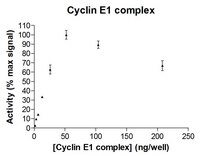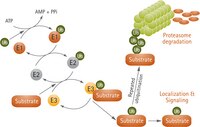23-031M Sigma-AldrichCyclin E1 Protein complex, 250 µg
Complex of full length, recombinant human proteins Cyclin E1 & CDK2. For use in Enzyme Assays. Behaves as a substrate in ubiquitin assays.
More>> Complex of full length, recombinant human proteins Cyclin E1 & CDK2. For use in Enzyme Assays. Behaves as a substrate in ubiquitin assays. Less<<Recommended Products
Overview
| Replacement Information |
|---|
Key Specifications Table
| Key Applications | Species | Cascade Component |
|---|---|---|
| Enzyme Assays | Human | Substrate |
| References |
|---|
| Product Information | |
|---|---|
| Quality Level | MQ300 |
| Applications | |
|---|---|
| Application | Complex of full length, recombinant human proteins Cyclin E1 & CDK2. For use in Enzyme Assays. Behaves as a substrate in ubiquitin assays. |
| Key Applications |
|
| Physicochemical Information |
|---|
| Dimensions |
|---|
| Materials Information |
|---|
| Toxicological Information |
|---|
| Safety Information according to GHS |
|---|
| Safety Information |
|---|
| Storage and Shipping Information |
|---|
| Packaging Information | |
|---|---|
| Material Size | 250 µg |
| Transport Information |
|---|
| Supplemental Information |
|---|
| Specifications |
|---|
| Global Trade Item Number | |
|---|---|
| Catalog Number | GTIN |
| 23-031M | 04053252294471 |









